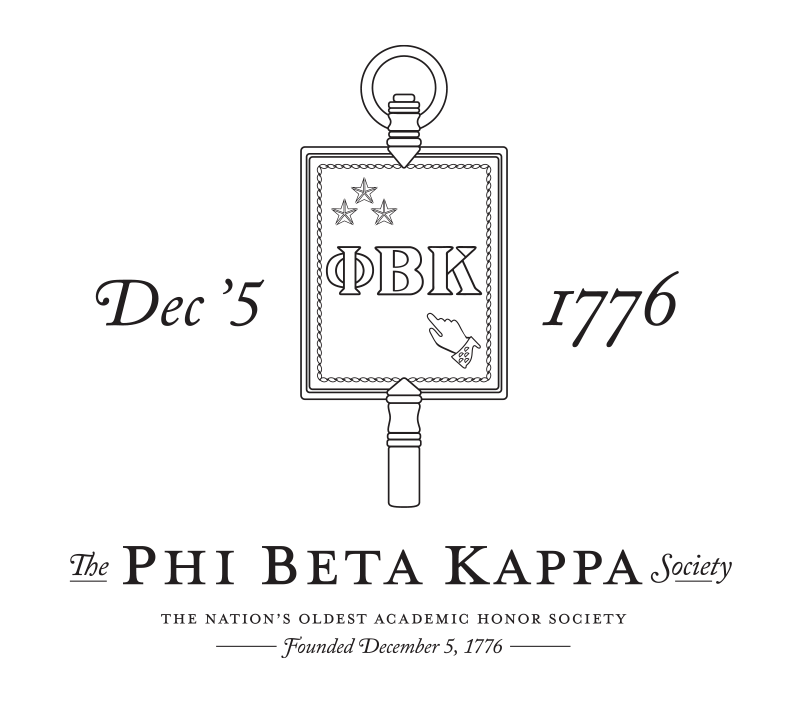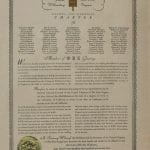
Phi Beta Kappa is the nation’s oldest and most prestigious national academic honor society.
Five students at the College of William & Mary founded Phi Beta Kappa during the American Revolution to advance their chosen motto, “Love of Learning is the Guide to Life.” A new nation would require institutions – cultural as well as political – as a grounding force and elevating influence in turbulent times. What began as a secret debating society in the midst of war became something very different over the course of the next two centuries. Phi Beta Kappa grew along with American higher education into an organization grounded in liberal – as in the Latin word for “free” – arts and sciences learning and freedom of inquiry. Today, Phi Beta Kappa is the nation’s most prestigious honor society, known for recognizing academic excellence on 290 select campuses across the nation. More than 500,000 members come from diverse backgrounds and experiences. On campuses and in communities, the work of the Society now attests to the lifelong value of an education that fosters scientific inquiry, liberty of conscience, critical thinking, and creative endeavor for all.
Early Days in Virgina
Phi Beta Kappa’s first meeting took place on December 5, 1776 in the Apollo Room of the Raleigh Tavern in Williamsburg, Virginia. John Heath, the organization’s first president, aspired to create a serious-minded student society that would offer more than just convivial social opportunities.
Phi Beta Kappa’s founders met in secret, to give members the freedom to discuss any topic they chose, no matter how controversial. The regimented curriculum typical of early American colleges allowed little opportunity for this; hence, Phi Beta Kappa’s chosen focus on “literary business,” that is, the holding of discussions and debates. Topics discussed ranged from history (Was Brutus justified in killing Caesar?) to politics (Is religion necessary in government?) to culture (What is the value of theater?).
Notably, the members also debated “the justice of African slavery.” The specifics of their arguments are unknown. Phi Beta Kappa’s early development took place at a time when slavery fundamentally shaped American colleges and the nation’s revolutionary experiment. The uncritical participation in a slaveholding society by many early members reflects a serious moral failing.
Building a National Organization
In the winter of 1781, the College of William and Mary shut down when General Charles Cornwallis positioned the British army on the York peninsula for what became the climactic siege of the American Revolutionary War. This closure might have ended the Society, but for its only non-Virginian member.
Elisha Parmele persuaded fellow members to allow colleges in New England to charter chapters. A native of Connecticut, Parmele helped create chapters at Yale in 1780 and Harvard in 1781, ensuring the continuation of the Society. Together with Dartmouth, which received its charter in 1786, these New England colleges formed the earliest collaborative network of chapters at the root of the modern PBK organization.
The first collegiate society identified with a Greek letter name, ΦBK introduced the essential characteristics of others that followed it: an oath of secrecy, a badge, mottoes in Greek and Latin, a code of laws, an elaborate form of initiation, a seal, and a special handshake.
After anti-masonic agitation in 1831 prompted much discussion about the ΦBK oath, Harvard’s chapter dropped the requirement for secrecy. This move probably saved the Society from further criticism and also helped to distinguish ΦBK, with its intellectual emphasis, from social fraternities that made their appearance around that time.
It took 100 years before chapters invited the first African Americans or women to participate in ΦBK. The first women were inducted as members at the University of Vermont in 1875, and at Connecticut’s Wesleyan University in 1876. The first African American men were elected at Yale in 1874 and at the University of Vermont in 1877, and the first African American woman was elected at Middlebury College in 1899.
The Society added new chapters slowly and deliberately throughout the nineteenth century, even as the number of colleges in the U.S. expanded rapidly. By 1883, Phi Beta Kappa had chartered 25 chapters. With a critical mass of chapters, representatives from PBK campuses formed the National Council of the United Chapters of Phi Beta Kappa, in the hopes of expanding their national influence. They developed a governing structure that could speak for the values of the Society as a whole and centralize the evaluation and governance of new chapters seeking charters of their own.
Phi Beta Kappa Today
There are now 290 chapters at American colleges and universities and nearly 50 active alumni associations located in all regions of the country. The most recent additions include Chapman University, Loyola Marymount University, Mississippi State University, and the University of South Florida.
The Society’s Triennial Council, its legislative body, convenes every three years to carry out the business of the Society. At its most recent meeting in 2018, this body adopted a resolution articulating the Society’s commitment to diversity and inclusion and incorporated it into the Society’s strategic plan. We recognize that the Society needs to do much more.
As we approach the upcoming 250th anniversary of Phi Beta Kappa, we continue to examine our history and our responsibilities. The Society is developing action steps to take now and in the future, to ensure that we affirm our values with concrete actions that are visible to our members, chapter institutions, and undergraduate students.

University of California
The first chapter for the University of California was established at Berkeley in 1898, followed by UCLA in 1930. UCI’s charter, Mu of California, was granted in 1974. Currently there are 290 chapters of Phi Beta Kappa with over 600,000 living members. Every three years the Society’s governing body considers applications from institutions desiring to establish chapters. At the 2009 Triennial Council, three new charters were awarded.
The Phi Beta Kappa key, the Society’s official insignia and emblem of membership, is one of the nation’s most distinctive symbols. The original key adopted at the first meeting of the Society was a square silver medal, engraved on one side with the letters SP, the initials of the Latin words Societas Philosophiae (“Philosophical Society”), and on the other side with PBK, the initials of the Greek motto, transliterated in the Latin alphabet as Philosophia Biou Kybernetes (“Love of learning is the guide of life”). A pointing finger and three stars symbolized the ambition of the young scholars and the three distinguishing principles of their Society — friendship, morality, and learning. Later a stem was added to the medal, converting it into a watch key.
Before the form of the key was standardized in 1917, there were many variations in the keys of different chapters. The contemporary gold key incorporates all of the symbols on the original eighteenth-century medal as well as the December 5, 1776, founding date. The recipient’s name, the name of the chapter, and the year of election are engraved on each key.
